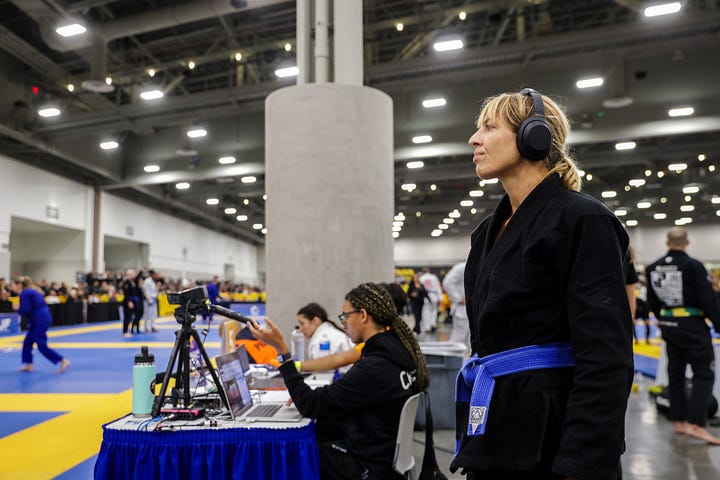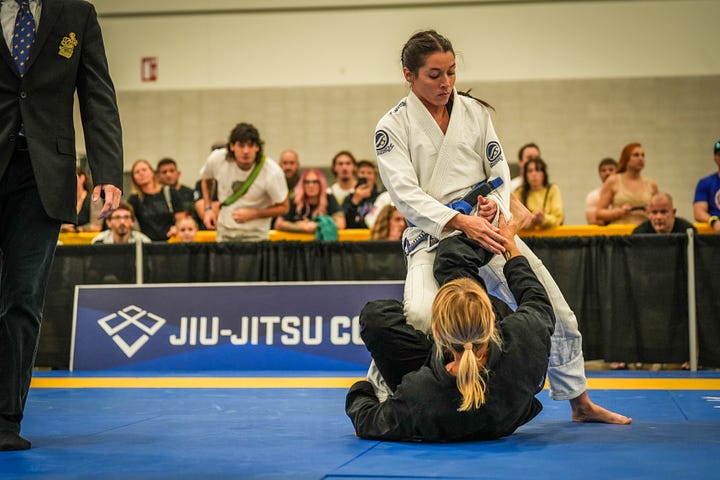“You can have anything in life, if you will sacrifice everything else for it.” — James M. Barrie
“COMBAT!”
The ref’s voice cuts through the air. I shake hands with my opponent, Madelyn Halligan, and it’s on. I grab her collar and sleeve, pulling her into my guard without hesitation — years of training firing into action.
It’s my fifth match of the day — the finals of the Master International Jiu-Jitsu Championship, the biggest competition of my blue belt jiu-jitsu career.
Halligan tries to pass my guard, which would secure her points and put me on defense. But there it is: the opening I’ve been drilling for years. I shoot my hips up and lock the triangle choke, squeezing my legs tight around her neck.
“She’s going to tap!” my coach, Jason Hunt, yells from the sidelines.
Seconds later, I feel the tap. My body collapses with relief. As I lay on the mat, hair and gi a disheveled mess, the reality sets in hard. I actually did it. All those three-times-a-day training sessions, the beatings from more experienced training partners, the month of cutting weight — it had all paid off.
But as the referee raises my hand, the rush of victory quickly fades, replaced by a heavy, quiet exhaustion. The full weight of every sacrifice — the thousands of hours on the mat, the feeling of being hit by a truck day after day, the moments of doubt — crashes over me.
Two and a half years ago, I made a choice. I would commit fully to jiu-jitsu. I was a complete beginner, but I wanted to train like a professional athlete — a dream I’d never fully allowed myself to pursue. Back then, before On Fire was even a thought, I was obsessed with the idea of passion. What would happen if we truly committed to something we loved? How would it transform us?
I had a theory — based on decades of “me-search” and passion research — that dedicating myself to something I loved would change my life for the better. Before I found jiu-jitsu, life felt like it was on autopilot, the days passing in grayscale. I was languishing. Once I committed, everything shifted. Suddenly, I had a reason to jump out of bed in the morning. The direction and purpose my training gave me made me feel more alive and more in touch with my childhood dreamer self.
From the outside, my success in jiu-jitsu might look inevitable. After all, I have 15 years of experience in fitness. For years, I’ve taken on fitness challenges — from calisthenics to handstands to boxing. But that’s far from the truth. It wasn’t natural talent or even luck. In fact, as my coaches will tell you, I was terrible when I first started. My journey wasn’t about the stars aligning — it was about making the choice to care deeply about something, every single day.
Yet as every passion-driven person will tell you, caring deeply comes at a price. For me, that price has showed up in many forms — physical and mental strain, time, relationships, and financial sacrifices.
Let’s start with the most obvious: the physical and mental toll. Like any sport, jiu-jitsu demands more from your body than you think it can handle. I’m constantly covered in bruises I can’t even remember getting. I’ve been lucky to avoid major injuries so far (though it’s probably less about luck and more thanks to my devoted mobility and flexibility routine), but that doesn’t mean I’m pain-free. I’ve had everything from knee bursitis — my knees swelling up to the size of grapefruits — to black eyes and mat burn, which hurts more than you’d think. I’ve woken up nauseous in the middle of the night from weight-cut strategies gone wrong. As I write this, there’s a rib in my upper back that’s out of place. It feels like a knife digging deeper with every breath I take.
Some days, I’m so physically and mentally exhausted that focusing on anything else feels impossible. There’s a reason professional athletes sleep for nine to eleven hours a day — it’s not just the physical strain that wears you down, but the mental strain of maintaining focus and intensity for hours on end. Some days my brain is more tired than my body.
Yet the physical and mental strain is only one part of the equation. Time is the big sacrifice. Unlike high intensity interval training (HIIT), the efficient style of fitness around which I built my first business, 12 Minute Athlete, learning a sport or skill as complex as jiu-jitsu requires a significant time investment. Jiu-jitsu classes involve a mix of learning, drilling, and then practicing what you’ve learned in a live setting — what’s known as “rolling.” These days, my training partners joke that I’m more like the “12 Hour Athlete” than the 12 Minute one.
Mastery, though, can’t be rushed. This is true for any multi-layered sport, or style of art, music, or craft. Six days a week, I train for two to four hours a day — and that’s not counting my strength and conditioning workouts. That’s pretty standard for high-level athletes (LeBron reportedly spends similar hours training daily). That’s time I no longer spend pursuing other hobbies or doing other things I love, like handstands.
And time is more than just a resource — it’s the clearest expression of what we care about. From the beginning, I’ve valued the time I dedicate to jiu-jitsu. What we spend our time doing reflects what we value most. If we’re truly passionate about something, we don’t just find the time for it; we plan for it and give it willingly, knowing that every hour spent is a part of the process, and there are no shortcuts.
Third, there are relationships. These inevitably take a backseat. This is partly due to time — saying yes to a passion means saying no to other things. Last-minute dinners with friends, spontaneous weekend trips, or even family vacations become harder to fit in. I’ve missed out on plenty, including a trip to Iceland with my family next summer because it overlaps with the biggest competition of the year.
But it’s not just about scheduling conflicts. It’s about understanding. When you fully commit to a passion, not everyone will get it. People don’t always understand why I’d skip a casual dinner on a Wednesday night to train. I’ve been asked more times than I can count, “Are you going to make money from this?” The answer is almost definitely no. I’m not in it for the money — I do it because I’m passionate about it. Because it matters to me in a way that’s hard to explain to those who haven’t experienced that kind of drive.
Some people respect that — they’ll rearrange plans and make time when you’re available. They come to see that your passion is an integral part of who you are. Others will tell you you’re crazy. They’ll say things like, “It’s just a hobby,” or, “Why don’t you skip training just this once?” And when you don’t, some of those friendships start to fade. I’ve lost friendships because of my passion for jiu-jitsu, and while it’s never easy, it’s a trade-off I’ve come to accept.
And then, of course, there are the financial trade-offs. We’ve all heard stories of Olympians whose parents took out second mortgages to help their children chase a dream. While I’m not an Olympian, I can relate. I’ve lost count of how much money I’ve poured into jiu-jitsu — monthly gym fees, private lessons, nutritionists, competitions, travel expenses, specialized gear. The costs add up quickly, and it’s easy to see how people might think it’s excessive.
But just like time, money is another way we show what we care about. What you spend your money on — beyond the basics — reflects your values. For me, three of my highest values are education, health, and mastery — and jiu-jitsu hits all three. Every dollar I’ve spent has been about reinforcing my core values. Reinforcing the truest version of me.
Is it a lot? Sure. But to me, it’s worth every penny, because it’s not just about winning competitions — it’s about becoming the best version of myself in the process. The financial sacrifices aren’t just about paying for training or gear; they’re about investing in growth. When you care that deeply, the trade-offs feel less like sacrifices and more like choices.
That doesn’t mean it’s always easy. Most days, I love the life I’ve chosen. I jump out of bed excited for the next training session, eager to learn and improve. I geek out on the nerdiest little details. But like anyone chasing a dream, there are days when that excitement fades. Burnout creeps in, and I wonder if I can keep pushing through the grind. Sometimes, I want to go to a concert without worrying about getting enough sleep for tomorrow’s training session or book a spontaneous vacation without checking my competition calendar first. At times like these, I momentarily question my choice, wishing I could just treat jiu-jitsu as a hobby — casually dipping in and out without caring so damn much.
Yet that’s not who I am. I care deeply. And on the days when the sacrifices feel suffocating, I remind myself of moments like the one two weeks ago, when a gold medal was placed around my neck — the symbol of everything I’ve worked so hard for. In those moments, the sacrifices feel small compared to the reward.
The cost of caring? A lot. But the pay off? Priceless... and far bigger.








comhghairdeas!! — congratulations Krista! Well done!! 🥳🎉 And thank you so much for this post. As someone who has had (or more accurately been consumed by) a series of passions, what you share gives me self-understanding and companionship, including around the cost —literally and metaphorically— of being “on fire.” Thankfully I don’t think I can help myself! ☺️ and great to know I’m not alone.